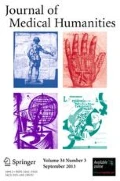Abstract
This paper is informed by my own participant observation and uses my own ethnography which included conducting in-depth interviews with anonymous paid egg donors and observing a listserv for women considering, pursuing, or having completed egg donation, to illustrate the way that power operates at this particular site of the reproductive center in postmodernity. After outlining who the consumers and providers of eggs are, I will use Foucault's concepts of biopower, disciplinary power, and normativity to describe how anonymous paid egg donation plays a socially useful role in reproducing privilege and in preserving the myth of the nuclear family. Drawing on feminist theorizing to problematize altruism, I will show how the construction of the altruist narrative feeds the preservation of that myth by giving egg donors appropriately feminine motivations. Finally, I will focus on one particular site of resistance on the part of egg donors—controlling their self-presentation, tweaking the pool of eggs—to underscore the simultaneity of control of and control by egg donors.
Similar content being viewed by others
References
Barad, D. H., & Cohen, B. (1996). Oocyte donation program at Montefiore Medical Center, Albert Einstein College of Medicine, Bronx, New York. In C. B. Cohen (Ed.), New ways of making babies: The case of egg donation (pp. 15–27). Bloomington, IN: Indiana University Press.
Belkin, L. (1997, October 27). Pregnant with complications. New York Times Magazine.
Cohen, C. (Ed.). (1996). New ways of making babies: The case of egg donation. Bloomington, IN: Indiana University Press.
Colen, S. (1995). “Like a mother to them”: Stratified reproduction and West Indian childcare workers and employers in New York. In F. D. Ginsburg & R. Rapp (Eds.), Conceiving a new world order: The global politics of reproduction. Berkeley, CA: University of California Press.
Corea, G., Klein, R. D., Hanmer, J., Holmes, H. B., Hoskins, B., Kishwar, M., et al. (1987). Man-made women: How new reproductive technologies affect women. Indianapolis, IN: Indiana University Press.
Dworkin, A. (1983). Right wing women. London: The Women's Press.
Foucault, M. (1978). The history of sexuality: An introduction (Vol. 1). New York: Random House.
Foucault, M. (1979). Discipline and punish: The birth of the prison. New York: Vintage Books.
Ginsburg, F. D., & Rapp, R. (Eds.). (1995). Conceiving the new world order: The global politics of reproduction. Berkeley, CA: University of California Press.
Griggers, C. (1993). Lesbian bodies in the age of (post)mechanical reproduction. In M. Warner (Ed.), Fear of a queer planet: Queer politics and social theory (pp. 178–192). Minneapolis, MN: University of Minnesota Press.
Heitman, E., & Schlachtenhaufen, M. (1996). The differential effects of race, ethnicity, and socioeconomic status on infertility and its treatment: Ethical and policy issues for oocyte donation. In C. B. Cohen (Ed.), New ways of making babies: The case of egg donation (pp. 188–212). Bloomington, IN: Indiana University Press.
Kaw, E. (1993). Medicalization of racial features: Asian American women and cosmetic surgery. Medical Anthropology Quarterly, 7 (1, 74–89.
Kimbrell, A. (1993). The human body shop: The engineering and marketing of life. San Francisco: Harper.
Kolata, G. (1998a, January 4). Infertile foreigners see opportunity in U.S. New York Times, p. A1.
Kolata, G. (1998b, February 24). Price soars for eggs given by women, setting off debate. New York Times, p. 1A.
National Advisory Board on Ethics in Reproduction (NABER). (1996). Report and recommendations on oocyte donation. In C. B. Cohen (Ed.), New ways of making babies: The case of egg donation (pp. 233–320). Bloomington, IN: Indiana University Press.
Nettleton, S. (1998). Inventing mouths: Disciplinary power and dentistry. In C. Jones & R. Porter (Eds.), Reassessing Foucault. New York: Routledge.
Pollock, A. (1998). The queers at the center of high-tech reproduction: A lesbian body sells her eggs. critical in Queeries, 2(1), 59–68.
Raymond, J. (1993). Women as wombs: Reproductive technologies and the battle over women's freedom. New York: Harper Collins.
Rich, A. (1986). Of woman born: Motherhood as experience and social institution (Tenth Anniversary Edition). New York: Norton.
Rothman, B. K. (1989a). Recreating motherhood: Ideology and technology in patriarchal society. New York: Norton.
Rothman, B. K. (1989b). Women as fathers: Motherhood and child care under a modified patriarchy. Gender and Society, 3 (1).
Stolberg, S. G. (1998, January 18). Quandary on donor eggs: What to tell the children. New York Times, p. A1.
Van Dyck, J. (1995). Manufacturing babies and public consent: Debating the new reproductive technologies. New York: New York University Press.
Whitehead, M. B. (1989). A mother's story: The truth about the baby M case. New York: St. Martin's Press.
Williams, P. (1997). Spare parts, family values, old children, cheap. In A. K. Wing (Ed.), Critical race feminism: A reader (pp. 151–158). New York: New York University Press.-
Author information
Authors and Affiliations
Corresponding author
Rights and permissions
About this article
Cite this article
Pollock, A. Complicating Power in High-Tech Reproduction: Narratives of Anonymous Paid Egg Donors. Journal of Medical Humanities 24, 241–263 (2003). https://doi.org/10.1023/A:1026010504214
Issue Date:
DOI: https://doi.org/10.1023/A:1026010504214




